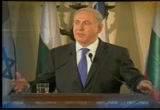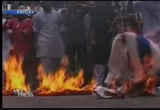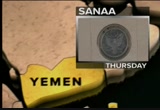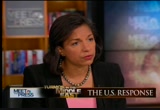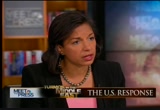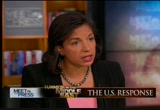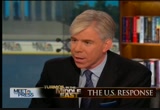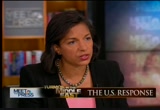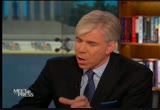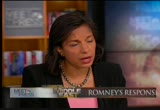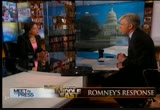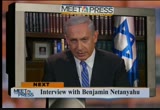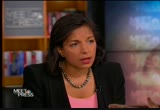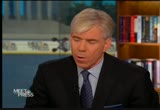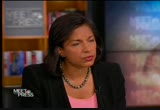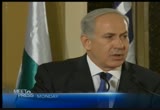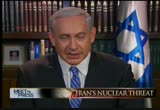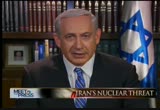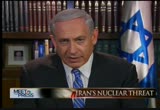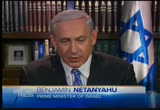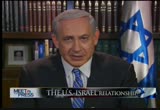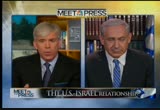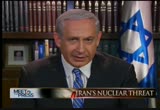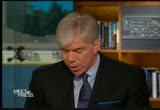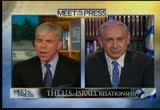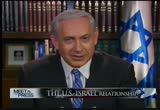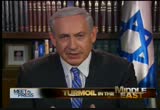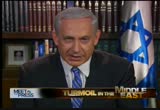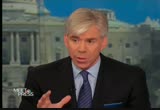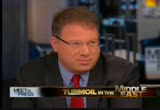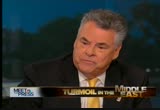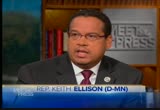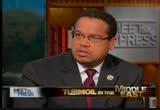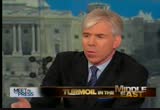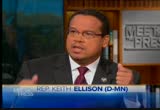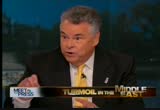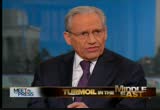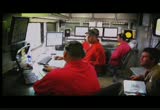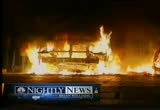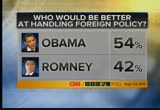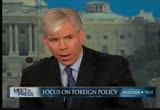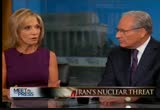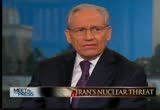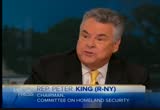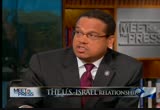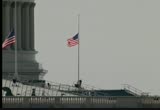tv Meet the Press NBC September 16, 2012 10:00am-11:00am EDT
10:00 am
this morning, a special hour of "meet the press." turmoil in the middle east creates a flashpoint on the campaign trail. set off by an american anti-islamic video, rage against the u.s. sweeps the arab world. and an attack on the u.s. consulate in libya kills ambassador chris stephens and three others. >> the people of egypt, libya, yemen, and tunisia did not trade the tyranny of a dictator for the tyranny of a mob. >> but in this highly charged campaign environment, new questions about how the obama administration should respond enter the political debate. >> the administration was wrong to stand by statements sympathizing with those who had
10:01 am
breached our embassy in egypt instead of condemning their actions. >> this morning, we'll talk to a key member of the president's foreign policy team, the u.s. ambassador to the united nations, susan rice. also this morning, an exclusive network interview with a key player in the middle east, the prime minister of israel, benjamin netanyahu. have relations between his country and the u.s. have hit a new low over the looming nuclear threat from iran? >> those in the international community that refuse to put red lines before iran don't have a moral right to place a red light before israel. sorting out u.s. options in the middle east, consequences for the region and the political impact in november. our political roundtable. joining us, the first muslim elected to the u.s. congress, democratic representative from minnesota, keith ellison. the chairman of the homeland security committee, new york republican congressman, peter king.
10:02 am
author of the new book, "the price of politics," "the washington post's" bob woodward. "the atlantic's" jeffrey goldberg. and nbc's chief foreign affairs goldberg. and nbc's chief foreign affairs correspondent andrea mitchell. captions paid for by nbc-universal television good morning. relative calm this morning in the middle east after several days of intense ti-american protests raged across many parts of the islamic world. and word this morning that the president obama has ordered evacuation of tunisia and sudan and the pentagon has deployed forces in several areas to in an increased effort to protect u.s. person nell and property from the potential of violent protests, the latest consequences of this troubling unrest. joining me now for the very latest, the u.s. ambassador to the united nations, susan rice.
10:03 am
ambassador rice, welcome back to "meet the press." >> thank you. >> the images, as you well know is jarring to americans watching this play out this week, and we'll share the map of this turmoil with our viewers to show the scale of it across not just the arab world but the entire islamic world. and flashpoints as well. in egypt, of course, the protests outside the u.s. embassy there that egyptian officials were slow to put down. this weekend in pakistan, protests as well there. more anti-american rage. also protests against the drone strike. in yemen, you had arrests and some deaths outside of our u.s. embassy there. how much longer can americans expect to see these troubling images and these protests go forward? >> well, david, we can't predict with any certainty. but let's remember what has transpired over the last several days. this is a response to a hateful and offensive video that was widely disseminated throughout the arab and muslim world. obviously, our view is that there is absolutely no excuse for violence, and that what has happened is condemnable.
10:04 am
but this is a spontaneous reaction to a video, and it's not dissimilar but perhaps on a slightly larger scale than what we have seen in the past with "the satanic verses" and cartoons of the prophet muhammad. the president has been clear that our top priority is protection of american personnel in our facilities and bringing to justice those who attacked our facilities. >> you talked about this as spontaneous. can you say definitively that the attacks on our consulate in lybia that killed ambassador stevens and others there was spontaneous? was it a planned attack? was there a terrorist element to it? >> let me tell you the best information we have at present. first of all, there's an fbi investigation that's ongoing and we look to that investigation to give us the definitive word as to what transpired. but putting together the best information that we have available to us today, our current assessment is that what
10:05 am
happened in benghazi was, in fact, initially a spontaneous reaction to what had just transpired hours before in cairo, almost a copycat of the demonstrations against our facility in cairo, which were prompted, of course, by the video. what we think then transpired in benghazi is that opportunistic extremist elements came to the consulate as this was unfolding. they came with heavy weapons, which unfortunately, are readily available in postrevolutionary libya. and it escalated into a much more violent episode. obviously, that's our best judgment now. we'll await the results of the investigation, and the president has been very clear we'll work with the libyan authorities to bring those responsible to justice. >> was there a failure here that this administration is responsible for, whether it's an intelligence failure, a failure to see this coming, or a failure adequately protect u.s. embassies and installations from a spontaneous reaction like this? >> david, i don't think so.
10:06 am
first of all, we had no actionable intelligence to suggest that any attack on our facility in benghazi was imminent. in cairo, we did have indications that there was the risk that the video might spark some protests, and our embassy, in fact, acted accordingly, and had called upon the egyptian authorities to reinforce our facility. what we have seen with respect to the security response, obviously, we had security personnel in benghazi, a significant number, and tragically, among those four that were killed were two of our security personnel. but what happened, obviously, overwhelmed the security we had in place, which is why the president ordered additional reinforcements to tripoli and why elsewhere in the world we have been working with governments to ensure they take up their obligations to protect us and we reinforce where necessary. >> the president and secretary of state have talked about a mob mentality. that's my words, not their words, but they talked about the tyranny of mobs. operating in this part of the
10:07 am
world. here is the reality. if you look at foreign aid, u.s. direct foreign aid to the two countries involved here, in libya and egypt, this is what you'd see. $200 million since 2011 to libya, and over $1 billion a year to egypt. and yet americans are seeing these kinds of protests and attack says on our own diplomats. what do you say to members of congress who are now weighing whether to suspend our aid to these countries if this is the response that america gets? >> well, first of all, david, let's put this in perspective. as i said, this is a response to a very offensive video. it's not the first time that american facilities have come under attack in the middle east, going back to 1982 in beirut, to saudi arabia, or even our attack on our embassy in 2008 in yemen. >> or iran in 1979. >> this has happened in the past. so i don't think that we should misunderstand what this is.
10:08 am
the reason we provide aid in egypt and lybia is because it serves american interests. >> but our americans are not being served if this is the response. >> it serves our interests to have egypt willing and able to maintain a peace treaty with israel, for egypt to continue to be a strong partner. let's be clear. the government, once president obama called president morsi, immediately in egypt, the security forces came out and have provided very significant protection. same in tunisia, same in libya, same in yemen. and all of these leaders have very forcefully conveyed their condemnation of what had transpired. >> there were conflicting messages from morsi. in arabic, they said protest. in english, they said protect. >> what has happened is that the egyptian government has protected our facilities. our embassy is open today. things are calm. and morsi has repeatedly been
10:09 am
clear in his condemnation of what has occurred. we are in these partnerships, david, over the long-term. despite the bumpy path and the disturbing images, it's in the united states fundamental interest that people have the ability to choose their own governments, that the governments be democratic and free. that's in our long-term best interest. we need to reinforce that. >> we are in the middle of a heated presidential campaign. there are different foreign policy visions. that's why we wanted to dedicate the hour today to understand these different views. mitt romney spoke out this week, criticizing the administration, talking about whether the united states was apologizing for some of the initial response to this. these were his comments this week. >> the administration was wrong to stand by a statement sympathizing with those who had breached our embassy in egypt instead of condemning their actions. i think it's a terrible course for america to stand in apology for our values.
10:10 am
>> our embassies did not stand up for free speech in this initial response to this violence. and the republican charge is that it's weakness on the part of this administration that invites this kind of chaos that the administration has not been tough enough on radical extremists that are beginning to take root in these countries. how do you respond to that? >> first of all, i think the american people and certainly our diplomats and development experts putting their lives on the line every day around the world expect from our leadership unity in times of challenge. and strong, steady, steadfast leadership of the sort that president obama has been providing. with respect to this, i think, vacuous charge of weakness, let's recall. i think the american people fully understand that this is an administration led by a president who said when he ran
10:11 am
for office that he would take the fight to al qaeda. we have decimated al qaeda. osama bin laden is dead. he said we would end the war responsibly in iraq. we've done that. he has restored relationships around the world. i spend every day up at the united nations where i have to interact with 192 other countries. i know how well the united states is viewed. i know that our standing is much improved. and it's translated into important support for strong american positions, for example -- >> is it inappropriate for governor romney to level the criticism he leveled? >> i'm not going to get into politics, david. that's not my role in this job. but i think the american people welcome and appreciate strong, steady, unified leadership, bipartisan, in times of challenge. and for those men and women in our diplomatic service, including those we tragically lost, they look to our leadership to be unified and strong. >> let's talk about leadership in the world, and as the nuclear threat from iran. another area of tension between the united states and israel.
10:12 am
in just a couple of minutes, we will show our interview with the prime minister of israel, benjamin netanyahu. our viewer will see that. one aspect is how close israel is getting to being a nuclear power. i want to show you a piece of the interview and get your reaction to it. >> i can tell you, david, that iran has been placed with some clear red lines on a few matters, and they have avoided crossing them. i think that as they get closer and closer and closer to the achievement of the weapons-grade material, and they are very close, six months away from being about 90% of having the enriched uranium for an atom bomb, i think you have to place that red line before them now, before it's too late. >> as the prime minister of israel, has iran crossed your red line? >> well, the way i would say it, david, is they are in the red zone. you know, they are in the last 20 yards. and you can't let them cross
10:13 am
that goal line. you can't let them score a touchdown, because that would have unbelievable consequences, grievous consequences, for the peace and security of us all. of the world really. >> what is president obama's line in the sand, the point at which he says to iran don't cross this with your nuclear program or there will be a military consequence? >> david, the president has been very, very clear. our bottom line, if you want to call it a red line, the president's bottom line has been that iran will not acquire a nuclear weapon. and we will take no option off the table to ensure it does not acquire a nuclear weapon, including the military option. but -- >> the prime minister says they are acquiring it. he is talking about how close they are to becoming a nuclear power. >> they are not there yet. and our assessment is, and we share this regularly with our israeli counterparts in the intelligence and defense community, that there is time
10:14 am
and space for the pressure we are mounting, which is unprecedented in terms of sanctions, to still yield results. this is not imminent. the window is not infinite. but let's be clear. the sanctions that are now in place reached their high point in july. the iranian economy is suffering. it's shrinks for the first time. negative 1% growth. the amount of production of iranian oil has dropped 40% over the last several months. their currency has plummeted 40% over the last several months. this pressure is even to use the iranian's own words crippling.
10:15 am
>> can you say that president obama's strategy to keep iran from acquiring a nuclear weapon almost at the end of his first term is succeeding or failing? >> david, what is clear is iran does not have a nuclear weapon. and that iran is more isolated than ever internationally. the economic pressure it is facing is much greater than ever. when president obama came to office, the international community was divided about iran. and iran was internally very united. the exact opposite is the case today. the international community is united. we just had another strong resolution. and the internal dynamics in iran are fracturing and the leadership is dividing. we are committed, and president obama is committed, to preventing iran from acquiring a nuclear weapon. it is not a policy of containment. but, david, the most difficult and profound decision that any president has to make is the decision to go to war. and this president is committed to exhausting pressure, economic pressure, and diplomacy, while there is still time, before making a decision of such consequence. >> ambassador rice, the debate continues. thank you very much. >> thank you. now to the looming nuclear threat from iran from the israeli perspective. the renewed tensions between the obama administration and israel this week. earlier, i spoke with the prime minister of israel, benjamin netanyahu, about where things stand and about whether he is trying to influence the outcome of our presidential campaign. prime minister, welcome back to "meet the press." >> thank you. good to be with you, david. >> i want to talk specifically before we get to the questions
10:16 am
of what's happening more broadly in the middle east and the turmoil there this week about the threat from iran. you spoke about that this week, and this question of whether israel has to take matters into its own hands. and you launched pretty pointed criticism at the united states. i want to play a portion of what you said. >> the world tells israel, wait. there's still time. and i say, wait for what? wait until when? those in the international community who refuse to put red lines before iran don't have a moral right to place a red light before israel. >> prime minister, i want to understand very clearly what your views are. is it your view that the obama administration is either unwilling or unable to stop iran from becoming a nuclear power? >> first of all, president obama and the u.s. administration have repeatedly said that israel has the right to act by itself against any threat to defend itself. and i think that that remains our position. and for me, the issue is -- as
10:17 am
the prime minister of a country that is threatened with annihilation with a regime that is racing a brutal regime in tehran that is racing to develop nuclear bombs for that end, obviously, we cannot delegate the job of stopping iran, if all else fails, to someone else. that was the main point that i was saying there. it was directed at the general international community. a lot of leaders calling me telling me, don't do it. it's not necessary. you know, the danger of acting is much greater than not acting. and i always say the danger of not acting in time is much greater because iran with nuclear weapons would mean that the kind of fanaticism that you see storming your embassies would have a nuclear weapon.
10:18 am
don't let these fanatics have nuclear weapons. >> prime minister, you were upset with this administration. the secretary of state hillary clinton had said there were no deadlines by this administration in terms of what iran should or shouldn't do by a date certain. that's what led to those remarks. so my question still stands. is it your view that this administration is either unwilling or unable to stop iran from developing a nuclear weapon? >> no. president obama has said that he's determined to prevent iran from getting nuclear weapons. and i appreciate that. and i respect that. i think implicit in that is that if you're determined to prevent iran from getting nuclear weapons, it means you'll act before they get nuclear weapons. i just think that it's important to communicate to iran that there is a line that they won't cross. i think a red line in this caseworks to reduce the chances to reduce the need for military action because once the iranians understand that there's no -- there's a line that they can't cross, they are not likely to cross it. when president kennedy set a red line in the cuban missile crisis, he was criticized. but it turns out it didn't bring war, it pushed war back and
10:19 am
probably purchased decades of peace with the soviet union. conversely, when there was no american red line set, saddam hussein invaded kuwait, and maybe that war could have been avoided. i think as they get closer and closer and closer to the achievement of weapons grade material, and they are very close, they are six months away from being about 90% of having the enriched uranium for an atom bomb, i think you have to place that red line before them now, before it's too late. that was the point that i was making. >> as a prime minister of israel, has iran crossed your red line? >> well, the way i would say it, david, is they are in the red zone. you know, they are in the last 20 yards. and you can't let them cross that goal line. you can't let them score a touchdown because that would have unbelievable consequences, grievous consequences, for the peace and security of us all. for the world really. >> that seems to be a newer
10:20 am
development from your way of thinking, that they are now in a red zone. and to use the sports metaphor, you won't let them cross the goal line. is israel closer to taking action into its own hands? >> we always reserve the right to act. but i think that if we are able to coordinate together a common position, we increase the chances that neither one of us will have to act. iran is very cognizant of the fact of its degrees of freedom. and not only have they not stopped, they are actually rushing forward with their enrichment program. and i think it's very important to make it clear to them that they can't just proceed with
10:21 am
impunity. >> your criticism, your calling on president obama to set this red line, comes in the middle of a heated presidential campaign. you understand the american political system very well. you're very sophisticated in that regard. in your view, would governor mitt romney as president romney make israel safer? would he take a harder line against iran than president obama in your judgment? >> i'm not going to be drawn into the american election. and what's guiding my statements is not the american political calendar but the iranian nuclear calendar. you know, if they stop spinning the centrifuges and took time out for the american elections, i wouldn't have to talk and i wouldn't have to raise this issue. but as the prime minister of israel, knowing that this country committed to our destruction is getting closer to the goal of having weapons of mass destruction, then i speak out. and it's really not a partisan political issue. and i think it's important for anyone who's the president of the united states to be in that position of preventing iran from having this nuclear weapon and nuclear weapons capability. and i'm talking to the president.
10:22 am
i just talked to him the other day. we are in close consultation trying to prevent that. it's really not a partisan issue. it's a policy issue. not a partisan issue. >> you have known mitt romney a long time. tell me if you disagree. the reality is that governor romney said this week that his position is very much the same as president obama. they are both committed to preventing iran from acquiring a nuclear weapon. not just as an impartial observer, but as the prime minister of israel. do you agree with that, that both the president and his challenger have the same view with regard to preventing iran from going nuclear? >> i have no doubt they are equally committed to preventing that. it's a vital american interest. this isn't the issue. we are united on this across the
10:23 am
board. >> why can't iran be contained just as the soviet union was? there are those in your country and in the united states that believe that a containment strategy would actually work. >> i think iran is very different. they put their zealotry above their survival. they have suicide bombers all over the place. i wouldn't rely on their or rationality. since the advent of nuclear weapons, you had countries that had access to nuclear weapons who always made a careful calculation of cost and benefit. but iran is guided by a leadership with an unbelievable fanaticism. it's the same fanaticism that you see storming your embassies today. do you want these fanatics to have nuclear weapons? i mean, i heard some people suggest, david -- i actually read this in the american press, they said, well, you know, if you take action, that's a lot worse than having iran with nuclear weapons. some have even said that iran with nuclear weapons would stabilize the middle east. stabilize the middle east. i think the people who say this have set a new standard for human stupidity. we have to stop them.
10:24 am
don't rely on containment. it would be wrong. it would be a grave, grave mistake. don't let these fanatics have nuclear weapons. it's terrible for israel. and it's terrible for america. it's terrible for the world. >> prime minister, one more question on the american election. you have been accused this week by pundits in this country of trying to interfere in this presidential election, siding with governor mitt romney. now, governor romney for a year, and he said it in his convention speech, has said, quote, president obama has thrown allies like israel under the bus. do you agree or disagree with governor romney's charge? it's a serious charge. >> well, you're trying to get me into the american election. and i'm not going to do that. the relationship between israel and the united states is a bond of -- just a very powerful bond. it was, it is, and will be. and will continue to be. and i can tell you there's no one -- there's no leader in the
10:25 am
world who's more appreciative than me of the strength of this alliance. it's very strong. there's no one in israel who appreciates more than me the importance of american support for israel. it's not a partisan issue. in fact, we cherish the bipartisan support of democrats and republicans alike. this is critical for us. >> but prime minister, if i may just interrupt you -- >> it is critical that we take -- >> this is an important point because you say you don't want to interfere in the election. there are tens of millions of americans who are watching that speech, who hear that rhetoric, hear that charge, and may not understand the complexity of this issue. you are the leader of the jewish people. you say this is not a partisan issue. you get billions of dollars from direct foreign investment in this country. hundreds of millions of dollars
10:26 am
from americans, jews and christians alike. it seems to me for you to remain silent on whether this administration has thrown israel under the bus is tantamount to agreeing with the sentiment. so where do you come down on that specific charge against president obama? >> there you go again, david, trying to draw me into something that is something not the case and is not my position. my position is that we have strong cooperation and we continue to cooperate with the best of allies. and israel is the one reliable ally of the united states in the middle east. >> president obama has not thrown israel under the bus? >> so it's -- there's no bus, and we're not going to get into that discussion, except to say one thing. we have a strong alliance, and we're going to continue to have a strong alliance. i think the important question is where does the -- the only bus that is really important is the iranian nuclear bus.
10:27 am
that's the one that we have to derail. and that's my interest. that's my only interest. >> final question on the broader middle east and what we're seeing this week. this anti-american and indeed anti-israeli rage throughout the middle east attacking our embassy, killing a united states ambassador as you well know. what has been unleashed and what can the united states and its allies specifically do to contain it? >> well, look, i think people focus on the spark. and the spark of reprehensible and irresponsible film is a spark, but it doesn't explain anything. it doesn't explain 9/11. it doesn't explain the decades of animosity and the grievances that go back centuries. in fact, there's a tinder box of hatred here there a virulent strain of islam that takes moderate muslims and arabs and attacks them first but seeks to deprive all of us of the basic values that we have. they are against human rights. they are against the rights of women. they are against freedom of religion. they are against freedom of speech and freedom of religion. they are against all the things that we value. they are against tolerance, pluralism, and against freedom. and they view not your policies but you, the very existence of the united states, and its values, and by extension israel, they view that as an intolerable crime.
10:28 am
and we have to understand that. and we have to deal with it. and we have to be in close support. because in this vast expanse of land, you can understand why they are so antagonistic to us. because for them, we are you, and you are us. and at least on this point they're right. >> finally, prime minister, did you feel snubbed not getting a face-to-face meeting with president obama in new york during the upcoming u.n. meetings? would you like to have that face-to-face encounter? would it be helpful to your relationship at this point? >> i'm always pleased and happy to have a conversation with president obama. i think he has met with me more than any other leader in the world and i appreciate that. we've had our discussions. our schedules on this visit doesn't work out. i come to new york and he leaves new york. but we continue in close consultations. we have urgent business, israel and america, to prevent iran
10:29 am
from getting nuclear weapons. i think it's important to delineate a red line for iran so we're not faced with a conundrum of what to do if we don't place a red line and they just proceed to the bomb. >> prime minister, thank you very much for your time. >> thank you, to all of you. coming up next, our political roundtable on the political impact of this turmoil in the middle east. is it a case of weakness on the part of this administration? did governor romney go too far in that politicism? democratic congressman from minnesota keith ellison, chairman of the homeland security committee. congressman peter king of new york. "the washington post's" bob woodward. jeffrey goldberg of "the atlantic," and our own andrea mitchell. "meet the press" is brought to you by the boeing company. we know why we're here. b.
10:30 am
to chart a greener path in the air and in our factories. ♪ to find cleaner, more efficient ways to power flight. ♪ and harness our technology for new energy solutions. [ female announcer ] around the globe, the people of boeing are working together, to build a better tomorrow. that's why we're here. ♪ that's why we're here. when you take a closer look... ...at the best schools in the world... ...you see they all have something very interesting in common. they have teachers... ...with a deeper knowledge of their subjects. as a result, their students achieve at a higher level. let's develop more stars in education. let's invest in our teachers... ...so they can inspire our students. let's solve this.
10:31 am
10:32 am
10:33 am
now, i'm going to be able to have the time to explore something different. it's like another chapter. to divvy up this shared data plan...fairly. so, um, whoever's fathered the most children, gets the most data. let's just do it by hair. body hair? most dental work. what? [ phones buzzing and beeping ] stop downloading, and stop liking everything. it should be by who has the least amount of cartilage in their left knee. [ mom ] i just want to take a bath. [ male announcer ] say no to sharing. say yes to sprint. with truly unlimited data, text and calling. we're back with our political roundtable. joining me, national correspondent for the "the
10:34 am
atlantic," jeff goldberg. nbc's chief foreign affairs corporate andrea mitchell. associate editor of "the washington post" and the author of "the price of politics," bob woodward. chairman of the homeland security commission, peter king. and keith ellison. there's a question i think that americans have of what is going on here. why is this happening? and it's happening, jeff goldberg, in a heated presidential debate. so you have accusations and response, and we've seen that play out already in the course of this hour. liz cheney, the daughter of the former vice president, launched a very serious attack that indeed governor romney amplified on. and she wrote in the "wall street journal" -- i want to show it to our viewers and get discussion about it. in too many parts of the world, america is no longer viewed as a reliable ally or an enemy to be feared, nor do our adversaries anymore fear us.
10:35 am
ask the mobs in cairo who attacked our embassy or the libyan mobs who killed our diplomats. ask the iranians who make unhindered daily progress towards obtaining a nuclear weapon. >> well, a couple of quick points. the first is, you know, to be fair, 9/11 happened during the bush administration, the bush-cheney administration. so it's not as if people -- muslim radicals feared the united states during that period. not when they were killing thousands of american troops in iraq certainly. the larger point is that, you know, there's a tendency, especially seven weeks out from an election, to turn everything that happens in the world into an election issue. there are some very deep and troubling things going on in the middle east that have very little to do with what a president does or doesn't do. let's be fair about this. you have a complete upheaval in the middle east. you don't have american policy makers being able to shape the way muslims think about the world, about modernity, about the united states. so to blame the president for an attack on these embassies, i
10:36 am
think, is a bit much. >> congressman, as a republican here, supporter of governor romney, is this american weakness that brought this on? is that the republican view? is that what the view of president romney would be? >> my view is it was a large component of it. this president's policy, president obama's policy, has been confusing, apologetic, and misguided. from the day he started his apology tour back in 2009 where he was, no matter what people say, apologizing for america, somehow suggesting that we have been anti-islam. so he became the president throughout -- even talking about iraq, taking our troops out of iraq. he was given a glide path in iraq, but he pulled the troops out. brags about the fact that troops are out. gives a definite date for getting out in afghanistan. what he is doing is telling their allies they can't trust us and also telling others that the u.s. is not a reliable ally. and the fact that you would have the prime minister of israel on this show explaining his
10:37 am
relationship with the president of the united states -- we have never had a such a disconnect between the israeli prime minister and the president. >> the prime minister of israel did not describe that as a snub. >> i'm saying it. >> it's ridiculous. the president has been consistent. he's been steady. and he set real progress and policy wins in the middle east. this is a seriously deeply rooted phenomenon, the arab spring, that will be unfolding for a long time. the last thing we need is to start making quick emotionally charged decisions. we need consistent steady leadership like the president has shown. >> there is a policy component, andrea and bob, to this and "the new york times" writes about it in a piece this morning. i want to put a portion of that on the screen. the upheaval over an anti-islam video has suddenly become mr. obama's serious foreign policy crisis of the election season, and a range of analysts say it presents questions about his
10:38 am
tenets of his foreign policy. did he do enough in the arab spring? has he drawn a hard enough line against islamic extremists? did his administration fail to address security concerns? >> first of all, i think we have to concede that george herbert walker bush's relationship with the then prime minister of israel was arguably much worse than what we're seeing now. so republicans as well as democrats have had difficulty, congressman, in the past with israel. >> in the post-9/11 world. there's never been a relationship like this. >> that said, assuming that this president has not handled the israeli-palestinian issue well, but the arab spring has been a much greater, much broader troubling issue that arguably not any american president could handle very effectively. that is not the argument. that is not the policy argument that mitt romney has made. mitt romney's -- the criticism of mitt romney is coming largely from many republicans who i talked to, foreign policy experts, who say that in the
10:39 am
middle of the crisis when the state department did not know where ambassador stevens was, when the body was missing, that he came out with a written statement and doubled down on it the next morning, and that it was not presidential, it did not show leadership. >> when he put out the statement he didn't know that the ambassador had been shot. >> then he shouldn't have put out a statement. >> that's exactly the problem. >> if you don't know something, how could he -- >> well, i think he could have waited. >> until you know more. >> what about reagan? he said when we have a crisis like this, we should all come together as americans and not divide up politically and try to seek a gain. that was -- >> president obama waited three days before he made a statement, and then he said, this was a sole individual bomber. >> the way to look at this neutrally, i just don't think the charge of weakness will stick. obama's been tough on these things. let's be realistic. the extremists in the middle east who were causing all of this trouble are extremists.
10:40 am
and no republican, no democratic president, is going to be able to control them. the question is, what's the policy? and what's the response? and you deal in the intelligence world and you ask the experts about this, and they'll say, you never know. 10 people are going to come together and take over an embassy, shoot someone and so forth. so the idea that government can -- has the puppet strings here is just -- >> well, let's get to the point, where are the extremists who are protesting about the fact that muslims are being killed in syria every day? you don't see those protests. is this about the united states or is it about them? >> it's about everything. the truth is it's about everything. it's unfolding. it will be unfolding for a generation. and you're right. you don't see -- you don't see that level of anxiety directed at syria. in the last week, hundreds of syrian muslims have been killed by the syrian regime. and you don't see syrian embassies being attacked. obviously, if you're -- you know, we talk so much about the
10:41 am
arab street, how the arab street feels about america. we have to start talking about the american street too. because this will have consequences for these governments that we support. americans see these countries that are -- that we provide billions of dollars to not directing our embassies, and eventually the american people will say enough already with this. >> this is a good time to realize that the so-called arab street is not one monolithic thing. you have some people in, say, libya, for example, who are holding up signs, apologizing for what happened to chris stevens. and we need to understand that this is not -- everybody is not on the same side. you have some radicals who want to push back. some -- our loyalists from the old regime, some extremists, who want to exploit the situation, and you have people who want a democratic society. they are both contesting for who's going to come out, and the united states should stay on their side. >> how do we appeal to the wrong people in the middle east by exalting this idea of the video being the cause of the riot? >> it's a spark.
10:42 am
not a cause. >> for us to say -- somehow putting that on the equivalence of the american policy, our policy in this country can be determined by a fanatical christian minister in the south or radical islamic mobs in the middle east, the president can do more. >> is it responsible for mitt romney to say that a president romney could have stopped this from happening? >> i think it's responsible for him to say that he would set a policy that would not be as confusing. why didn't the next day the president even mention president morsi? he did not say a word about the fact that our supposed ally was getting a billion dollars not to defend our embassy in cairo. the president did not mention that. >> when the president called, morsi listened. >> everyone is being critical of mitt romney. president obama made his statement, and he did not even mention the failure of leadership in egypt. >> congressman, you're correct. i think that it is easy for the administration to try to point to the film. there is a much broader issue, as jeffrey and bob have been pointing to. the world is changing.
10:43 am
and it is changing too rapidly for any american leadership to figure out what to do. there is going to be a big argument over foreign aid. you know that. and whether or not that is even a sensible argument is another question. they have a big problem with morsi. morsi needs economic aid. he has -- i've been told he has reached out to the new york economic club. he wants to give a speech here in 10 days. he knows he needs the imf. he knows he needs the united states. but he is trying at the same time to placate the radical elements in the brotherhood. >> but the core problem is there are angry people out there. and you can't identify them. and the idea that you're going to have a government policy to deal with angry people in a way that will suppress them just is not going to happen. >> let me break in here and come back with the roundtable. more on this. the political impact right in the middle of the campai [ male announcer ] wouldn't it be cool if we took the nissan altima and reimagined nearly everything in it? gave it greater horsepower and best in class 38 mpg highway...
10:44 am
...advanced headlights... ...and zero gravity seats? yeah, that would be cool. ♪ introducing the completely reimagined nissan altima. it's our most innovative altima ever. nissan. innovation that excites. ♪ ♪ [ multiple sounds making melodic tune ] ♪ [ male announcer ] at northrop grumman, every innovation, every solution, comes together for a single purpose -- to make the world a safer place. that's the value of performance. northrop grumman. o0 and every day since, two years ago, the people of bp made a commitment to the gulf. we've worked hard to keep it. bp has paid over twenty-three billion dollars
10:45 am
to help people and businesses who were affected, and to cover cleanup costs. today, the beaches and gulf are open for everyone to enjoy -- and many areas are reporting their best tourism seasons in years. we've shared what we've learned with governments and across the industry so we can all produce energy more safely. i want you to know, there's another commitment bp takes just as seriously: our commitment to america. bp supports nearly two-hundred-fifty thousand jobs in communities across the country. we hired three thousand people just last year. bp invests more in america than in any other country. in fact, over the last five years, no other energy company has invested more in the us than bp. we're working to fuel america for generations to come. today, our commitment to the gulf, and to america, has never been stronger. it's something you're born with. and inspires the things you choose to do. you do what you do...
10:46 am
10:47 am
back with our roundtable. look at this polling from cnn/orc. better at handling foreign policy, big advantage for president obama as we go into the debates. >> i was troubled by something that susan rice said before, which is talking about how people are offended by this movie and sort of apologizing for this film. i think there's a perpetual grievance machine working in the middle east. bob points this out. people will be angry no matter what. and at a certain point, i think the administration should just say, look, we have free speech in america. it is part of our value system.
10:48 am
opposition to blasphemy is part of your value system and we respect that as long as you do it peacefully. but we'll stand up for our liberal western values. >> salmon rush dee. we backed down on that also. >> you want to stand strongly and also support liberal thought in the middle east. and that means engaging. you have to remember, most muslims in the middle east aren't attacking american embassies. many want more liberal open societies. >> is our only leverage in the united states money and foreign aid? >> absolutely not. we have a lot of influence in terms of culture, in terms of just the way america is a democratic society. we should use that. all the protests we saw were four people reaching for a greater level of democracy. but foreign aid is a part of it. for us to threaten to snatch aid is dangerous and a bad idea. >> the question of iran as well, andrea, i want to get reaction to the prime minister. he said something among the significant things, they have an equal commitment, he said, mitt
10:49 am
romney and president obama, to prevent iran from going nuclear. that is not the wedge that governor romney has been arguing. he said you re-elect president obama they go nuclear, you elect me and they do not. >> and yet mitt romney himself misspoke apparently in another interview saying that he agrees with president obama on what that imaginary red line is. i thought it was very interesting that prime minister netanyahu said they were in a rhe red zone. the football analogy. but he was trying to smooth over the differences. but there are very real differences. real differences in that while president obama has made a commitment to stop them from weaponizing, from going nuclear, they believe somehow in this notion that they will have the intelligence, they will know when the ayatollah makes a political decision, and they will still have the time. and arguably in the past, we've learned that intelligence is not that precise. >> so much turns on intelligence. it was interesting, your discussion with the israeli prime minister, and he said, well, it's six months, and
10:50 am
they'll have 90%. and ambassador rice said, well, it's not imminent that they are going to get the bomb. if you study intelligence as i have for about 40 years, and jeffrey and i were talking about, some day we're going to write a book called "the unintelligence of intelligence." because it's just often wrong. and people are surprised. and, you know, deep, deep uncertainty about all of this -- 90%, six months, it's not going to happen. you don't know. >> what about this interference in our election? you're curious about that from both of you, because he takes on -- well, i pressed him on that. >> well, there's two issues. one is a legitimate issue, which is this debate over red lines. this is the debate that obama and netanyahu should have, a discussion, in private. and that's legitimate for netanyahu to raise. what's illegitimate, and let me put it as bluntly as i can. i have been watching the relationship with israel and the u.s. for over 20 years and i
10:51 am
have never seen a israeli prime minister mismanage the relationship with the administration the way this prime minister has. obama is not blameless. the first year, the peace process was a disaster. but, you know, one person -- one person here is the senior and one is the junior, and netanyahu has turned this into a story about himself and obama. >> i disagree. i'm not here to criticize our president. but the fact is that in 2009, when he went to the middle east and suggested the moral equivalency between the iranians and the israelis, harping against the israelis, the fact is the israeli government does not trust the american government. and that's really the issue. not when the red line is there and where it is. this is a president who came in saying he was going to restore harmony among nations, he was going to have a better relationship with overseas allies. and adversaries. >> do you double down on the comment that this president has thrown israel under the bus? >> he has not -- yes, i will. in the context of politics, yes, he has, absolutely.
10:52 am
>> there's no foundation on that. >> it's either true or it's not. >> it is true. and let me tell you why. you had an israeli prime minister when he went to the white house being put off by himself, ignored by the president. the president refusing to sit down with him at the u.n. this is an ally. he's not going to treat morsi this way. to treat an ally like that is throwing him under the bus. >> the relationship is as good as it's ever been. and so the point is this is a sad reality where we are putting israel as a political football in an election that should not be done. and as a matter of fact, i think that the president -- that prime minister netanyahu ought to be more careful not asserting himself. >> andrea, what do you look for this week as we move beyond, as this conversation moves? >> i think there are more security challenges. you've got embassies shut down. the marines are going to be more engaged in various places. this is a crisis. and it could rebound against president obama. >> before we go, take a break, i wanted to let you know you can catch more of bob woodward in
10:53 am
10:54 am
10:55 am
a beloved san diego bakery expand, what's important to communities across the country is important to us. and we're proud to work with all of those who are creating a stronger future for everyone. ♪ i can do anything ♪ i can do anything today ♪ i can go anywhere ♪ i can go anywhere today ♪ la la la la la la la [ male announcer ] dow solutions help millions of people by helping to make gluten free bread that doesn't taste gluten free. together, the elements of science and the human element can solve anything. solutionism. the new optimism. before we go this morning, a couple of programming notes. you can watch this week's press pass conversation on our blog as well. a lot going on on the blog. straight talk from the much
10:56 am
talked about simpson-bowles. that's at meetthepress@nbc.com. also thursday on "rock center with brian williams," ted koppel goes toe-to-toe for a provocative new look at open partisan media and the role it's playing in our society. that's on "rock center" thursday at 10:00 p.m. eastern, 9:00 central. that is all for us today. we'll be back next week. if it's sunday, it's "meet the press." as we leave you, we remember the lives of ambassador chris stevens and the three other americans lost this week in the dad. listen, we're gonna go broke unless we figure out a way to divvy up this shared data plan...fairly. so, um, whoever's fathered the most children, gets the most data. let's just do it by hair. body hair? most dental work. what? [ phones buzzing and beeping ] stop downloading, and stop liking everything. it should be by who has the least amount of cartilage in their left knee.
10:57 am
[ mom ] i just want to take a bath. [ male announcer ] say no to sharing. say yes to sprint. with truly unlimited data, text and calling. there's natural gas under my town. it's a game changer. ♪ it means cleaner, cheaper american-made energy. but we've got to be careful how we get it. design the wells to be safe. thousands of jobs. use the most advanced technology to protect our water. billions in the economy. at chevron, if we can't do it right, we won't do it at all.
10:58 am
we've got to think long term. we've got to think long term. ♪ we've got to think long term. we've got to think long term. blog as much as you like, but if you really want to make an impact, vote. then, what matters to you and the people you care about will really count. you'll want to vote the more you know.
10:59 am
but it isn't always easy to find one... anncr: a good job. it's the key yoto a good life.te a vote for question seven is a vote for maryland jobs. two thousand construction jobs to build a new resort casino. four thousand permanent jobs, paying... on average fifty five thousand a year. six thousand jobs from increased tourism... and table games like blackjack and poker. add it up: it's twelve thousand new maryland jobs. but to build it you have to vote for it. vote for question seven. and get maryland back to work.
183 Views
IN COLLECTIONS
WBAL (NBC) Television Archive
Television Archive  Television Archive News Search Service
Television Archive News Search Service 
Uploaded by TV Archive on

 Live Music Archive
Live Music Archive Librivox Free Audio
Librivox Free Audio Metropolitan Museum
Metropolitan Museum Cleveland Museum of Art
Cleveland Museum of Art Internet Arcade
Internet Arcade Console Living Room
Console Living Room Books to Borrow
Books to Borrow Open Library
Open Library TV News
TV News Understanding 9/11
Understanding 9/11
